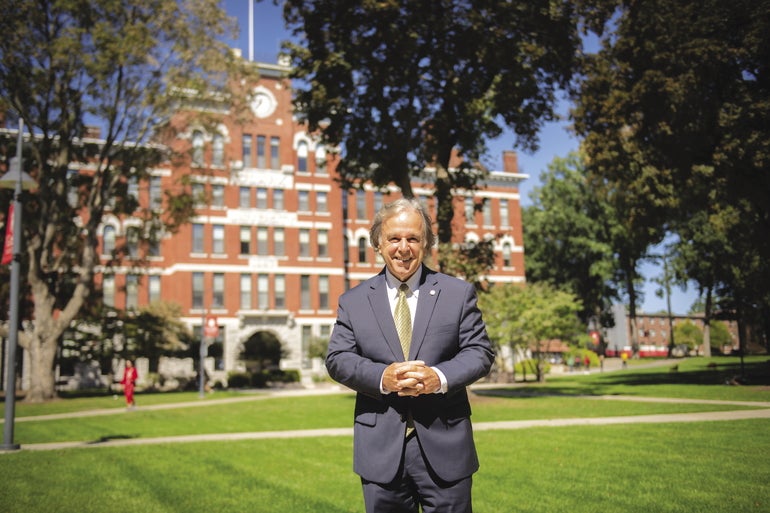On June 1, Clark University renamed its School of Management as the School of Business.
Get Instant Access to This Article
Subscribe to Worcester Business Journal and get immediate access to all of our subscriber-only content and much more.
- Critical Central Massachusetts business news updated daily.
- Immediate access to all subscriber-only content on our website.
- Bi-weekly print or digital editions of our award-winning publication.
- Special bonus issues like the WBJ Book of Lists.
- Exclusive ticket prize draws for our in-person events.
Click here to purchase a paywall bypass link for this article.
In 1887, Jonas Gilman Clark founded Clark University. Described by a New York Times article from that year as one of Central Massachusetts’ wealthiest capitalists, the school the Hubbardston-born entrepreneur, business owner, and real estate investor founded was originally a graduate-only school focused on the study of subjects related to science and math.
Despite Clark’s business background, it would be nearly a century after the university’s founding before the school launched its School of Management in 1982 with a daylong symposium entitled “The United States in Today’s Competitive World.”
On June 1, Clark University marked the beginning of the next chapter of the school by officially renaming the School of Management as the School of Business, representing an attempt to make the school stand out in today’s competitive world of collegiate admissions by doubling down on its focus of attempting to provide the next generation of business leaders with the tools to make the world a better place.
Jordan’s last dance
While Clark has been having a larger conversation about the next chapter of its business-focused school for about a year and a half, the August appointment of David Jordan as interim dean of the then-School of Management accelerated these discussions, said Sebastian Royo, Clark University provost and vice president for academic affairs.
“He came up with a clear sense of the market and the opportunities. Both locally, but also nationally and internationally,” said Royo of Jordan, who had the interim part of his title dropped in February when he was named to a three-year term as dean.
Jordan was already familiar with the Clark campus. A 2002 graduate from the university with a master’s degree in public administration, he already had two decades of experience as an adjunct professor.
Jordan spent 28 years at the helm of Worcester-based nonprofit Seven Hills Foundation & Affiliates, growing the small nonprofit into the largest charitable organizations in Central Massachusetts, with a focus on providing care and support for people with disabilities.
Following a very brief retirement that lasted merely days, Jordan was quickly recruited to lead Clark’s business program into its next chapter.
“You have someone that has all the business acumen, the business network, the career in the market, at the same time, the passion for the case,” Royo said. “So it was a perfect opportunity for us when we found out that he was stepping down [from Seven Hills] to offer him this opportunity and he really embraced it.”

What’s in a name?
Clark’s discussions over the future of the now-School of Business predated Jordan’s arrival as dean, but a changing the name of the school itself was an idea he brought to the table.
“In fact, that was one of my and initial sets of recommendations to President [David] Fithian and Provost Royo,” Jordan said. “Like any institution, every once in a while, you have to reposition, rebrand, and take stock of how you're operating and what you're doing.”
By definition, a name change is quite literally a matter of semantics. But both Royo and Jordan agree the School of Business rebrand is an important step in larger efforts to make it clear that Clark prioritizes both providing broad education to students, while providing them with the specialized focus needed to succeed in modern society.
“It was a natural response to the demand of the market for more specialized degrees,” Royo said, “We had identified that the market demands more specialization, so we needed to offer more degrees rather than just management. That was too generic, too broad, and not particularly attractive.”
The name change will appeal to the next generation of college students, who are beginning to ask questions about the role of business in society, Jordan said.
“The School of Management has for 42 years responded to the interests and needs of students,” Jordan said, “but students that are coming in this fall are our students who are asking a lot more questions about the relevance of business and the importance of business.”
This new evolution of the school will make it clear where Clark’s priorities lie, he said.
“So one might ask: ‘What is the purpose of business? Is it just to make money?’ Our answer here at Clark is a resounding no,” he said. “It's certainly to make money and to do well in business, but to also contribute to the welfare of local, national, and global societies from which these people and students come from.”
By highlighting Clark's renewed approach with the school as a place where the business leaders who are a force for positive change, Royo said the university can help bridge the gap between the liberal arts and business worlds, pushing back against preconceived notions about what it means to study business.
“What I perceive from students that are in some of our humanities or social science programs is that there’s almost a little bit of antagonism against anything that has to do with business or with money,” Royo said. “How do we educate them that you can make a difference in the world by generating wealth? It’s not an either-or proposition.”

By breaking down these stereotypes surrounding economic studies, students whose main focus is elsewhere can still have the business acumen to survive in the modern economy, he said.
“It is important for a lot of our students who are going to be self employed or have their own little business, that they need to have those basic skills of how to run an organization,” Royo said.
Slipping interest in business education
Clark’s reimagining of its business school comes as the total number of applications to business graduate management education programs in the U.S. declined 3.2% in 2023, according to a survey of 900 institutions conducted by the Graduate Management Admission Council, an international nonprofit organization of business schools based in Virginia.
Undergraduate interest in business degrees has been relatively flat over the past five years; the amount of freshman enrolled in business-focused programs in the United States declined 0.21% between 2019 and 2024, according to data provided by the Virginia-based National Student Clearinghouse Research Center.
While domestic interest in business studies has seen declines, international students are picking up some of the slack; 63% of surveyed graduate institutions saw growth or stability in the amount of international applicants, up from 47% in 2018, according to GMAC.
Royo sees this new evolution of Clark’s School of Business as a chance to tap into this international market.
“One of our most significant populations for business programs are international students, particularly at the graduate level, but also at the undergraduate level,” he said, “When we get a request from international students that they want to study accounting, for example, we want to make sure that they understand that this School of Business offers accounting, not just management.”
Local presence
Not content with just a name change, Clark is looking to expand the physical footprint of its business offerings to both students and the community-at-large.
In January, the university announced it plans to expand the presence of its Small Business Development Center to an off-campus location in the heart of downtown Worcester.
Dubbed the Worcester Idea Lab, the space is meant to foster interaction and collaboration between students at Clark, students from other area colleges, and the broader Worcester business community.
“It offers us resources where students can work on their entrepreneurial ideas and meet with small business owners, and also expands opportunities with a visible presence in the heart of the Worcester business community,” Jordan said in a January press release announcing the lab. “We’re thrilled to see this new business think-tank already in action and look forward to watching our students and the SBDC continue to thrive.”
This new location in the city’s urban core will help enhance connections with the communities, particularly entrepreneurs who are new to America’s shores, Royo said.
“One of the priorities that we have is to serve immigrants, to set up startups, companies, and also to offer internships for students,” he said. “It's another exciting development. We always wanted to have a footprint downtown.”
Looking further off into the future, Royo hopes the business school’s evolution will eventually lead to a new School of Business facility.
The school’s current home, Carlson Hall, was built in 1890, according to City of Worcester property records. Royo feels that a modern, state-of-the-art facility is a crucial component in attracting the next generation of socially-minded business students and academic staff.
“We are about to launch a capital campaign, and this will be one of the areas of priority,” he said. “We want a building that is innovative and will foster collaboration and interdisciplinary group work. We think it will be a landmark of business education.”
CORRECTION: An earlier version of this story incorrectly said that David Jordan graduated with an MBA in 2022; He actually graduated in 2002.

